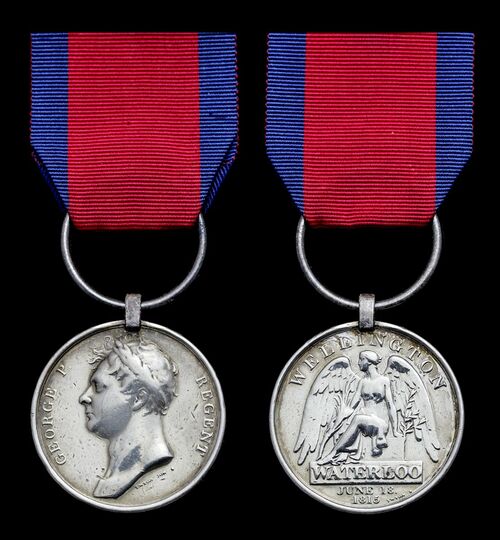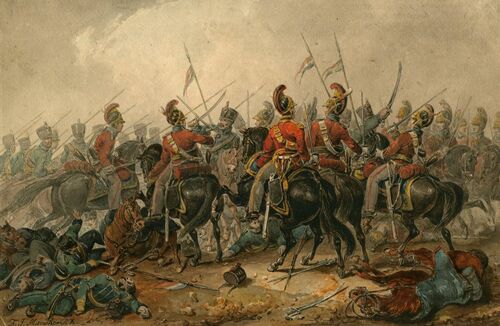Auction: 24002 - Orders, Decorations and Medals
Lot: 39
The Waterloo Medal awarded to Private G. Beetham, 2nd Life Guards, who suffered a sabre wound to the head on that famous day
Waterloo 1815 (George Beetham, 2nd Reg. Life Guards.), fitted with original steel clip and ring suspension polished, nearly very fine
George Beetham was born in 1794 in Leeds and attested with the 2nd Life Guards at York in 1812, later serving in the Peninsula from May 1813 to July 1814 where he may have been present with his Regiment at the Battle of Vittoria and the Battle of Toulouse.
At the Battle of Waterloo, they were part of Major-General Lord Somerset's Household Brigade alongside the 1st Life Guards, the Royal Horse Guards, and the 1st Dragoon Guards. During the battle they were positioned to the left of the Brigade, just west of the Brussels road. Cavalry commander Lord Uxbridge ordered the Union and Household Brigades to charge against Comte d'Erlon's infantry columns which were attacking the left centre at La Haye Sainte. To remain unseen by the French, Uxbridge had formed the Brigades behind the ridge and took advantage of the element of surprise in organising the charge and coming over the crest of the hill, the British slammed into the French forces with the 2nd Life Guards smashing into the 1st Cuirassiers.
After slaughtering a great number of the enemy and routing even more, the cavalry did not heed orders to halt their charge and the unit joined the Union Brigade in their charge of the French Grand Battery. The ensuing counter attack was disastrous for the British cavalry, whose retreat was blocked by General Travers' Cuirassiers. Beetham was injured by a sabre wound to his head, which was most likely inflicted at this point by one of the Cuirassiers. The British cavalry sustained heavy losses from the counter attack and the 2nd Life Guards suffered the highest casualty rate of any British cavalry unit, with 155 men out of an initial strength of 231 lost during the battle; a casualty rate of 67%.
They arrived in Paris on 7 July alongside the Duke of Wellington and served as part of the Army of Occupation until their return to London in February 1816. Notably, the Waterloo veterans of the Regiment formed the guard of honour at the opening of Waterloo Bridge in London the next year on 18 June.
Beetham was discharged at Regents Park Barracks in January 1835, and is unlikely to have long survived his discharge as he does not appear on census records from 1841, the pension rolls, nor the Military General Service Medal roll; sold together with copied research.
Subject to 20% VAT on Buyer’s Premium. For more information please view Terms and Conditions for Buyers.
Sold for
£1,900
Starting price
£1100







